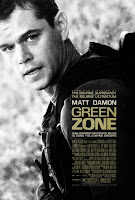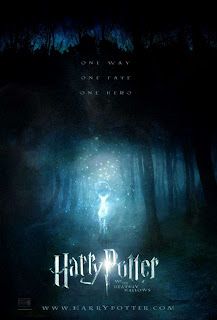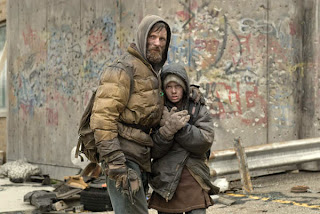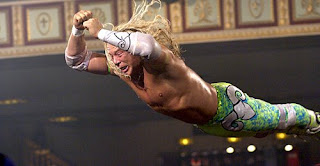Back in March, three friends (Jason, Elijah, and Ryan) and I made the sparking decision to go see “Watchmen” at a midnight premiere. It was a fun night filled with all kinds of exciting revelations such as what happens when someone brings a baby to a violent, 3 hour movie at midnight. It had been several years since I’d done a midnight premiere of a film and it got us all talking.
As most of you know, I’m a huge, huge, HUGE movie nerd. At the beginning of each calendar year (and then again sometime in the middle) I go through the IMDB calendar for the next 6 months to a year and make a list of all the movies I’m going to want to see in the theater. (Side note: I don’t really remember what my life was like before IMDB became a part of it. It’s the greatest movie industry innovation since color film.) When I made that list this year, my nerd radar went crazy over the absurd number of summer films that could be considered Nerd Fodder. It started the first week in May with “X-Men: Wolverine” and continued through this week with “G.I. Joe: The Rise of Cobra.” Naturally, I deemed this three month period The Summer of the Nerd.
After the success of the “Watchmen” premiere (screaming baby aside), I decided this was a prime opportunity to form a club. The principals of the Summer of the Nerd club were threefold:
1.) We would see every nerd movie that made its way to theaters;
2.) We would see each of these movies at midnight;
3.) We would make t-shirts.
That’s really all there was to it. A group of loyal nerds was assembled and the principals were agreed upon. Seven films were to be considered eligible for official Summer of the Nerd viewings: “Wolverine,” “Star Trek,” “Terminator: Salvation,” “Land of the Lost,” “Transformers 2,” “Harry Potter 6,” and “G.I. Joe.” (Note: both “Up” and “Public Enemies” would have made this list as well had the theater owners allowed for a midnight release. Their loss.) With the schedule and the participants in place, LB designed a shirt and the rest was history.
Seven times the group gathered between 10 and 11 pm at United Artist Fossil Creek Stadium 11 to take place in the nerdiness. Sometimes the group was small (only four of us for “Terminator”) and sometimes huge (even Stephen’s mom came to “Harry Potter”). Sometimes the movies were great (“Star Trek”), sometimes not so great (more to come on the atrocity that was “G.I. Joe.”). Sometimes it was hotter than the first level of the underworld in the theater and once we even got refund passes due to the heat stroke many of us endured. One time we even got “an exclusive in depth look” at the movie we were about to see during the pre-preview commercials.
But always the night was fun. The hours before each film actually began were filled with ridiculous hypotheticals, the sharing of nerdy videos (like this one), and relentless mocking of the nerds around us. Each viewing brought a couple of hours hanging out with friends and engaging in nerdy, witty banter that likely annoyed everyone around us. In what other time of life could you take bets on the length of the loop of trivia slides shown before the movie starts (never longer than 2 minutes, 37 seconds)? A great time was had by all and if nothing else we each came away with a t-shirt. What else can you really ask for in life?
Unfortunately all good things must come to an end. As the last week approached, my nerdy friends and I grew wary of what we were about to endure with “Joe.” The warning signs were as follows:
1.) The trailers gave us numerous shots of the Joes wearing “accelerator suits” that made them faster, stronger, etc. This went against everything G.I. Joe stood for;
2.) Aside from Dennis Quaid, the top-billed actors in this film are Channing Tatum, Sienna Miller, and (gulp) Marlon Wayans;
3.) The studio did not screen it for critics. (Note: this is probably the worst sign of all. Over the years, the ONLY movie I can think of that didn’t screen for the critics and turned out even passably good is “Tombstone.” That’s it.) The only place you could find a real review of this movie prior to its release was from Ain’t It Cool News;
4.) Again, Marlon Wayans is one of the four “name” actors. Marlon Wayans.
The best way I can describe my feelings towards “G.I. Joe” is to repeat what I told one of my friends as we watched the disaster unfold on the screen: this movie gave me a new appreciation for Michael Bay. If you’re unfamiliar with Michael Bay, just check out his IMDB page. (Seriously, what the heck did we do before IMDB?) Bay has became synonymous with big budget, high octane, special effects driven summer blockbusters that are heavy on action and low on trivial little things like competent acting and writing. Still, he makes money and for all his flaws (which are immense) he is a wizard with the camera. He does amazing things that keep the audience from fully realizing or focusing in on the TREMENDOUS plot holes and TERRIBLE dialogue that plague his films. I’ve bashed on Bay quite a bit in the past and I cringe each time I see his name attached to a film I have any interest in because every single time, I know that coming out of the theater I will say one thing: “Well, it was another Michael Bay film.”
Michael Bay represents everything is wrong with the movie industry and yet I longed for him to be at the helm of “Joe.” Please understand how much it pains me to say that. Instead Stephen Sommers, whose best credit to this point is as director of “The Mummy” (seriously), was in charge of “Joe” and the results are lacking. Sommers attempts to do what Bay does with each of his films but as it turns out he’s just as bad of an actual director as Bay with none of the camera wizardry to keep him afloat. In addition, he writes most of his own films and continues to prove himself to be one of the world’s worst writers. Ever. And I don’t just mean screenwriters; I mean all writers in the history of the world. When you combine all of this with truly a cast that, as a whole, can’t act and CGI that is truly abysmal, you get a disastrous result.
I imagine the development of this film went something like this:
Day 1 - Stephen Sommers is tabbed as director;
Day 2 - Sommers finishes an all night party (at which he was reportedly heard yelling, “I got another film! Can you believe it?! Those morons gave me another film!”) at 4 a.m. and begins writing;
Day 3 - Sommers wakes up from a nap at noon, realizes his script is only 10 pages long, and fills in the rest with some summaries of scenes from “Star Wars” and the words, “BIG EXPLOSION” after every third line of dialogue;
Day 4 - A casting meeting is held at which Sommers says, “I don’t care how well they can act, just make sure they look good.” Channing Tatum and Sienna Miller are cast on the spot;
Day 5 - Shooting begins;
Day 6 - Sommers realizes his cast is stale and lacking in depth so the decision is made to bring in a well respected veteran actor to “anchor the kids”;
Day 7 - Dennis Quaid receives a script for “Joe” and thinks, “What the heck, I’m 55, I don’t get that many opportunities to make a million dollars for 2 days of work” and takes the gig;
Day 8 - Sommers realizes his cast needs some comedic release and acts the studio, “who can we get for fifty thousand dollars?” Marlon Wayans starts immediately;
Day 9 - Shooting finishes and CGI production begins;
Day 10 - Instead of hiring a real effects company to take care of the massive number of CGI shots the film has, Sommers gives the job to two former roommates, his wife’s nephew, and the son of a casino owner whom he owes a favor;
Day 11 - “Joe” is delivered to the studio and the decision is made to keep it away from the critics as long as possible.
And that’s how you make a Stephen Sommers film. I could be quite content with “Joe” as a “Transformers” knock off and from the moment this film was announced I fully expected it to be more about the action than the acting. I can handle that. Summer blockbusters are supposed to be about fun and entertainment, not awards. But when your actors are bad, your script is rotten, and your shots are lacking, you sure as heck better have amazing effects to counter it all. “Joe” misses the mark on all four counts. This movie is attempting to be too big. It wants to be “Transformers” when really it should be shooting for something more along the lines of “The Island.” There’s nothing wrong with being a throwaway action film, as long as you’re not trying to be THE throwaway action film. But most importantly, no one (audience and critics alike) is going to overlook huge flaws when the action sequences aren’t spectacular.
Still, as several of my fellow nerds said, sometimes it’s less about the film and more about the company. I think all of us would have preferred a different final film to close out the Summer of the Nerd. But in the end, we all gathered with our matching shirts for one last Nerdout before the summer came to a close. It was a good time with good friends and maybe that’s really all you can ask for from a summer movie.
“G.I. Joe:” D. Summer of the Nerd: A+.
Brendan Fraser makes a random appearance in this film,
Brian
 I'm purposely trying not to know much about this before I see it. What I do know is Denzel has never done a straight action/fighting movie like this before and I'm excited to see it. And it doesn't get any better than Gary Oldman in the role of the villain.
I'm purposely trying not to know much about this before I see it. What I do know is Denzel has never done a straight action/fighting movie like this before and I'm excited to see it. And it doesn't get any better than Gary Oldman in the role of the villain.

 6. Green Zone (March 12)
6. Green Zone (March 12)
 1. Harry Potter and the Deathly Hallows Part 1 (November 19)
1. Harry Potter and the Deathly Hallows Part 1 (November 19)



